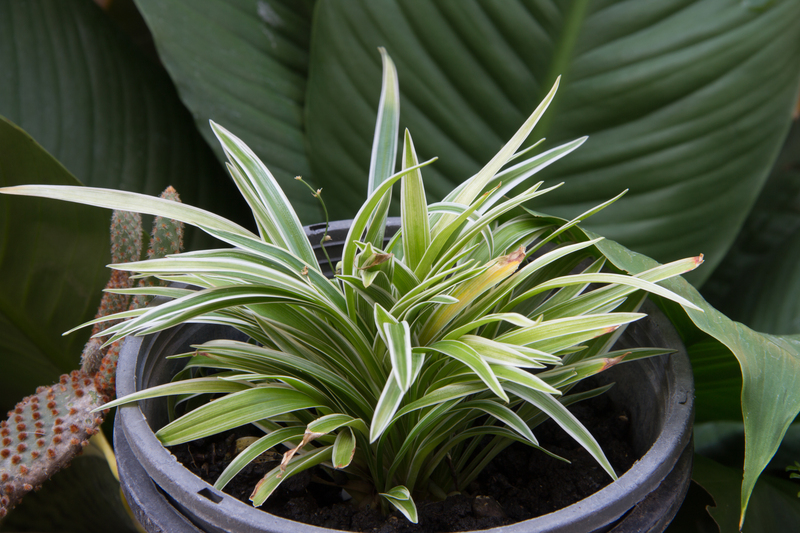A Guide to a Safe and Playful Garden for Little Ones
Posted on 02/07/2025
A Guide to a Safe and Playful Garden for Little Ones
Creating a garden that is both secure and stimulating for young children can transform your outdoor space into a magical environment where kids thrive. As parents, caregivers, or grandparents, our commitment is to ensure little ones not only explore nature but also stay safe. This comprehensive guide covers every aspect of designing, maintaining, and enjoying a child-safe play garden that delights and protects.
Why Design a Kid-Friendly and Secure Garden?
A safe and playful garden for little ones offers boundless opportunities for fun, learning, and growth. Studies show that children who spend time outdoors are healthier, more creative, and more resilient. This article explores how to craft a play garden that balances adventure with safety, creating an inviting haven where kids can run, dig, laugh, and thrive.

Planning Your Child-Proof Garden Space
Before picking up a shovel, thoughtful planning lays the foundation for a successful and secure backyard for children. Detailed preparation ensures every corner is enjoyable and free from hazards.
1. Assess Your Outdoor Area
- Size and Layout: Measure available space and note sun exposure, slopes, shaded spots, and potential obstacles.
- Existing Elements: Identify trees, sheds, fences, ponds, and any features that require protection or modification.
- Entry and Exit Points: Make a checklist of all gates, doors, and potential escape routes.
2. Involve the Little Ones
A playful garden design means actively engaging your child in the planning process. Ask them about their favorite games, colors, and activities. Incorporate their ideas to foster a sense of ownership and excitement.
3. Zoning: Designated Play Areas
Organize your child-friendly garden by dividing it into distinct zones:
- Active play area: For running, jumping, and sports.
- Sensory garden corner: Filled with plants of various textures, colors, and scents.
- Quiet retreat: A cozy spot for reading, watching butterflies, or napping.
- Edible zone: Raised beds or containers where kids can grow their own fruits and veggies.
Garden Safety Fundamentals for Children
While outdoor play is essential, it's crucial to eliminate risks. Below are safety guidelines for a secure and playful garden:
1. Fencing and Secure Boundaries
A robust fence is the first line of defense. Ensure all fences are at least four feet high, with small enough gaps to prevent squeezing through. Lockable gates and self-closing latches keep children within bounds.
Tips:
- Inspect fences for sharp edges or protruding nails regularly.
- Install gate alarms for added peace of mind.
- Fence off ponds, pools, or other water features with childproof barriers.
2. Choose Non-Toxic Plants
Plants are part of every enchanting play garden, but some can be hazardous. Opt for non-toxic, kid-safe plants. Good choices include sunflowers, marigolds, nasturtiums, and lavender.
- Avoid highly toxic species such as foxglove, oleander, and lily of the valley.
- Label plant beds and teach children never to nibble without adult permission.
3. Safe Surfaces
Falls are a leading cause of injuries in play areas. Soft landing zones under swings, slides, or climbing structures make a difference. Install:
- Play-grade bark mulch
- Pea gravel
- Rubber mats or tiles
- Artificial turf designed for playgrounds
4. Secure Play Equipment
Regularly inspect playhouses, slides, and climbing frames for:
- Sturdy anchoring to prevent tipping or shifting
- No rust, splinters, or exposed bolts
- Appropriate age-level designations and weight limits
5. Supervision and Visibility
Design your playful garden for easy supervision. Avoid hidden corners or densely planted areas that block sightlines. Place benches near play zones so adults can keep watch comfortably.
Enriching the Play Garden Experience
A safe and playful backyard is not only about eliminating hazards but also about creating joy-filled opportunities for discovery. Here are key elements that inspire curiosity and imagination.
1. Sensory Gardens
Sensory gardens stimulate a child's five senses. Consider plants that:
- Have fragrant leaves or flowers (e.g., mint, rosemary, lavender | for smell)
- Are soft and interesting to touch (e.g., lamb's ear, ornamental grasses)
- Offer color and movement (e.g., sunflowers, butterfly bush)
2. Edible Gardens - Let Kids Grow and Taste
Kids love to dig, plant, water, and harvest! A child-safe edible garden invites hands-on learning about food. Start with easy crops such as:
- Cherry tomatoes
- Strawberries in containers
- Radishes (fast-growing)
- Lettuce and spinach
- Herbs like basil or chives
3. Nature-Inspired Play Structures
Encourage climbing, balancing, and role-play with kid-friendly garden features:
- Sandpits with secure covers
- Low timber balance beams
- Mini outdoor kitchens for imaginative cooking games
- Tree stumps or log circles for jumping and storytelling
4. Wildlife Discovery Corners
Attract butterflies, bees, and birds by including wildlife-friendly plants and features:
- Bird baths (shallow and cleaned regularly)
- Bug hotels made from bamboo or wood
- Butterfly-attracting blooms such as zinnias or coneflowers
Routine Maintenance: Keeping Your Garden Safe and Healthy
A secure play area for young kids is easy to enjoy when well maintained. Periodically walk through your garden and:
- Remove weeds or invasive plants that might choke safe picks
- Clear away fallen branches, sharp sticks, or litter
- Check for loose boards, rusty nails, or splintered wood
- Top up mulch or safe surfacing under play equipment
- Ensure no standing water that could harbor mosquitoes
Teaching Children Garden Safety
An empowered child is a safer child. Garden safety for little ones includes age-appropriate education about potential dangers and respectful use of the garden.
Teach kids to:
- Ask before picking or tasting any plant
- Wear hats, sunscreen, and closed-toe shoes outside
- Help tidy up toys and tools after playing
- Identify signs (such as "No Running") and follow rules
Best Garden Accessories for Play and Safety
Enhance your safe play garden for kids with smart accessories, including:
- UV-blocking canopies or shade sails over sandpits and play spaces
- Colorful storage bins for toys, keeping clutter off paths
- Solar-powered night lights for added visibility in evening play (for older children)
- Weatherproof mats or rugs for picnics and storytime
Creative DIY Projects for a Secure & Exciting Child Garden
Family projects foster bonding and personal investment. Simple weekend tasks:
- Painted rock trails: Let kids paint smooth stones and lay out winding "paths."
- Personalized stepping stones: Cement kits are fun and let children leave handprints or their names in the garden.
- Wind spinners and pinwheels: Bright decorations add motion without risk.
- Homemade scarecrows: Craft using old clothes and let kids choose the outfit.

Adapt Your Garden as Children Grow
A playful, child-safe backyard evolves alongside your growing youngster. What works for toddlers may differ from a school-aged child. Update your space to include:
- More challenging climbing or balance features
- Build-your-own raised beds for older kids interested in gardening
- Cool-down zones in summer (mini "spray park" using hoses or sprinklers)
- Larger social spaces when friends visit
Conclusion: Welcome to Years of Safe, Joyful Play
A safe and playful garden for little ones is more than a backyard--it's a storybook world, a science lab, and a sanctuary rolled into one. By combining clever design, sensible safety measures, and enchanting play features, you'll nurture resilience and imagination every day.
With a bit of effort, every family can create a wonderful, child-proof outdoor haven--where those first muddy footprints and giggles echo for years to come. Start small, involve your children, and let their joy guide your choices. The rewards are endless.
Further Reading
- Royal Horticultural Society: Plants for children's gardens
- NSPCC Guide to Garden Safety
- Nature Play Australia
Latest Posts
Unlock the potential of potted plants through container gardening
Creating a Wind-Resilient Garden Environment
Kickstart Your Gardening Journey with These 9 Vital Tips

